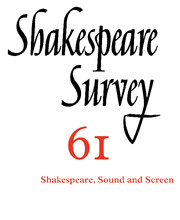Book contents
- Frontmatter
- Sarah Siddons, theatre voices and recorded memory
- Playing with Shakespeare’s play: Branagh’s Love’s Labour’s Lost
- Bottom and the gramophone: Media, class and comedy in Michael Hoffman’s A Midsummer Night's Dream
- Maurice Evans’s Richard II on Stage, Television and (Almost) Film
- Richard II on the Screen
- ‘Where Lies Your Text?’: Twelfth Night in American Sign Language Translation
- ‘This uncivil and unjust extent against thy peace’: Tim supple’s Twelfth Night, or what violence will
- ‘There’s no such thing’: nothing and nakedness in Polanski’s Macbeth
- Ghosts and mirrors: the gaze in film Hamlets
- ‘Ben, it’s a terrible thing to hate your mother’: mind control in Hamlet and The Manchurian Candidate
- Channelling the ghosts: the Wooster Group’s remediation of the 1964 Electronovision Hamlet
- Listening to Prospero’s Books
- Lend Me Your Ears: Sampling BBC Radio Shakespeare
- An Age of Kings and The ‘Normal American’
- Shakespeare and British Television
- A Local Habitation and a Name: Television and Shakespeare
- Paying attention in Shakespeare parody: from Tom Stoppard to YouTube
- Madagascan will: cinematic Shakespeares / transnational exchanges
- Still life? Anthropocentrism and the fly in Titus Andronicus and Volpone
- Riddling q1: Hamlet’s mill and the trickster
- ‘Speak, that I may see thee’: Shakespeare characters and common words
- Who do the people love?
- A Partial Theory of Original Practice
- Shakespeare Performances in England, 2007
- Professional Shakespeare productions in the British Isles, January–December 2006
- The Year's Contributions to Shakespearian Study 1 Critical studies
- 2 Shakespeare in performance
- 3a Editions and textual studies
- 3b Editions and textual studies: The RSC Complete Works
- Index to Volume 61
Madagascan will: cinematic Shakespeares / transnational exchanges
Published online by Cambridge University Press: 28 November 2008
- Frontmatter
- Sarah Siddons, theatre voices and recorded memory
- Playing with Shakespeare’s play: Branagh’s Love’s Labour’s Lost
- Bottom and the gramophone: Media, class and comedy in Michael Hoffman’s A Midsummer Night's Dream
- Maurice Evans’s Richard II on Stage, Television and (Almost) Film
- Richard II on the Screen
- ‘Where Lies Your Text?’: Twelfth Night in American Sign Language Translation
- ‘This uncivil and unjust extent against thy peace’: Tim supple’s Twelfth Night, or what violence will
- ‘There’s no such thing’: nothing and nakedness in Polanski’s Macbeth
- Ghosts and mirrors: the gaze in film Hamlets
- ‘Ben, it’s a terrible thing to hate your mother’: mind control in Hamlet and The Manchurian Candidate
- Channelling the ghosts: the Wooster Group’s remediation of the 1964 Electronovision Hamlet
- Listening to Prospero’s Books
- Lend Me Your Ears: Sampling BBC Radio Shakespeare
- An Age of Kings and The ‘Normal American’
- Shakespeare and British Television
- A Local Habitation and a Name: Television and Shakespeare
- Paying attention in Shakespeare parody: from Tom Stoppard to YouTube
- Madagascan will: cinematic Shakespeares / transnational exchanges
- Still life? Anthropocentrism and the fly in Titus Andronicus and Volpone
- Riddling q1: Hamlet’s mill and the trickster
- ‘Speak, that I may see thee’: Shakespeare characters and common words
- Who do the people love?
- A Partial Theory of Original Practice
- Shakespeare Performances in England, 2007
- Professional Shakespeare productions in the British Isles, January–December 2006
- The Year's Contributions to Shakespearian Study 1 Critical studies
- 2 Shakespeare in performance
- 3a Editions and textual studies
- 3b Editions and textual studies: The RSC Complete Works
- Index to Volume 61
Summary
Conventionally understood as the movement of émigrés across national borders, transnationalism has been described as affecting ‘groups ... no longer occupying discrete spaces or ... cultures’, as prompting individuals to forge ‘relations that link together their societies of origin and settlement’ and as encouraging the creation of ‘geographically dispersed ... migrant communities’. The reverberations accompanying transnationalism are most easily identified in the flows of capital that traverse state parameters, in deterritorialized constructions of space, in the development of hybridized identities, in the determining power of technology and in the simultaneous collapse and reinforcement of local–global associations. Complementary interpretations of transnationalism pursue the phenomenon’s ideological meanings and implications. Commentators are interested in the ways in which transnationalism licenses exchanges and interactions that contribute to the ‘intermingling of cultures’; as Aihwa Ong writes, ‘transnationality ... alludes to the transversal ... the translational, and the transgressive aspects of contemporary ... imagination ... the multiplicity of ... conceptions of culture’. Such transactions are not bound by the physicality of place, since, as a number of observers have pointed up, ‘we attempt’ more and more to comprehend ‘our . . . transnational world’ via ‘symbolic and imaginary geographies’. Transnationalism is a historically specific and economically determined product of the late twentieth and early twenty-first centuries; at the same time, it is indissoluble from a unique aesthetic that might function as a register of collaborative and cross-fertilizing cultural processes.
- Type
- Chapter
- Information
- Shakespeare Survey , pp. 239 - 255Publisher: Cambridge University PressPrint publication year: 2008



